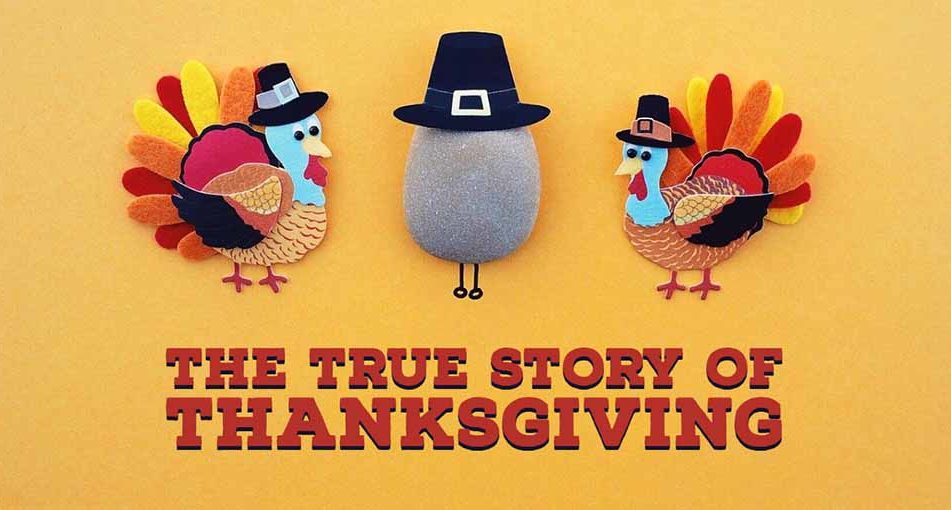On November 3, 2008, I originally printed the essay below. We have reprinted it each year since on Thanksgiving weeks, with small alterations to address issues of the time, and it never ceases to garner a huge reaction. In 2021, more than ever, people need to be reminded of the positive roots of their nation…and despite what you’re told seemingly on the daily, there are some positive things about America. The story below is 100% provably true (and footnoted accordingly), and the fact that most of you have never heard it before is scandalous to say the least:
What really happened in 1621, at the first alleged “Thanksgiving feast” in what would later become America? Most Americans, sadly, don’t know. If they even have an answer, it usually involves a fake narrative of Native Americans feeding starving pilgrims, only to be thanked years later with genocide. While it is true that Pilgrims and Indians ate together, both sides contributed equal amounts of food over the three-day feast…and while it is true that war led to Europeans conquering what later became America (which was quite literally the way of life in the 17th century), the true story and message of that first Thanksgiving is entirely lost and essentially covered up by focusing on what we’re all supposed to view as America’s racist founding. This country has been “woke” when it comes to Thanksgiving for decades.
The real events of the original Thanksgiving are known and have been known since they happened, in 1621 thanks to a man named William Bradford, who most people learned about (wrongly) and have long since forgotten. Bradford was the governor of the Plymouth Colony and kept copious notes in real-time of all events occurring to the Pilgrims and is also, some believe, the true father of what later became known to be Capitalism, the American monetary system.
Bradford’s words have never been disputed. He wrote every day for more than 30 years as the Pilgrims assimilated into the colonies. Multiple sources confirmed more than most of his observations through simultaneous yet separate writings, all but irrefutably proving Bradford’s perception of events that were happening right before his very eyes. Sadly, this is unimportant to history revisionists. To them (and most of them are teaching your children) it is more important to twist facts or make them up entirely so that people in America are taught to hate themselves and their country so that they will go through life atoning for, what in some cases are, non-existent mistakes of our genuinely horrific past. We’ve had, and continue to have, plenty of missteps on our way to forming a more perfect union; we don’t need to fabricate stories of bigotry that never happened.
The true story of Thanksgiving is actually one of the most inspiring tales of entrepreneurship and the human work ethic ever written. The true story of Thanksgiving highlights one of life’s eternal truths; each of us has the ability to rise above challenges seemingly greater than our skills and not just survive, but thrive if we desire to do so. The true story of Thanksgiving is about choosing to win and refusing to lose; which in the 17th century meant choosing to live and refusing to die. The true story of Thanksgiving is not only not shameful, it is one of the building blocks upon which the greatest nation in Earth’s history was built. And for those of you who are mistaught snowflakes that are somehow still reading, that nation is the United States of America. Still.
In his ‘History of Plymouth Plantation,’ the governor of the colony, William Bradford, reported that the colonists went hungry for years because they refused to work in the fields. They preferred instead to steal food. He says the colony was riddled with “corruption,” and with “confusion and discontent.” The crops were small because “much was stolen both by night and day before it became scarce eatable.”
This, in my opinion, furthers the notion that, at our core, most humans are both lazy and unmotivated, yearning not for some prideful pursuit of earning our keep, but always choosing the path of least resistance if we are so allowed. People will always choose what’s easiest if they’re allowed to. If you give someone what they perceive to be free food and/or shelter in perpetuity, they will happily accept it, for it is in their nature to do as little as possible. Those of us with work ethic, drive, and a prideful belief that we must earn what we get were taught that, not born with it.
In the famed and fabled harvest feasts of 1621 and 1622, we’re told to believe that the Indians showed up and fed the settlers out of generosity, but this is absolutely false. The colonists had produced their own food, but very little. The prevailing condition during those years was famine and death. The first “Thanksgiving” was not so much a celebration as it was the last meal of condemned men.
But in subsequent years something changed. The harvest of 1623 was different. In fact, in 1624, so much food was produced that the colonists were able to begin exporting corn.
What happened?
After the poor harvest of 1622, writes Bradford, “they began to think how they might raise as much corn as they could, and obtain a better crop.” They began to question their form of economic organization. As has happened countless times throughout history, desperate, starving men deemed that “good enough” was no longer good enough.
Originally and prior to 1623, the pilgrims had operated under the “it takes a village” system and required that “all profits & benefits were to be placed in the common stock of the colony, and that, “all such persons as are of this colony, are to have their meat, drink, apparel, and all provisions out of the common stock.” In other words, everything that everyone made, grew, harvested, invented, or found was placed in one big pile for the entire community to share. A person was to put into the common stock all that he could, and take out only what he “needed.” In other words, it didn’t matter if a colonist had ever contributed a damned thing to the bounty; he or she was still entitled to his or her share of the food, drink, and clothing. That share, incidentally, was determined solely by individual greed and desire, and based in no way on them having earned any of it or having contributed anything to it. Each person helped themselves to as much of whatever they desired.
This “from each according to his ability, to each according to his need” was an early form of socialism, and it is why the Pilgrims were starving in 1621 and1622. Bradford writes that “young men that are most able and fit for labor and service” complained about being forced to “spend their time and strength to work for other men’s wives and children.” So, the young and strong refused to work and the total amount of food produced was never adequate.
To rectify this situation, in 1623 Bradford abolished socialism amongst the pilgrims. No longer would there be a community pool of rations. No longer would few work, so that all could have. He surveyed the land they held and he gave each household a parcel of land and told them they could keep what they produced, or trade it away as they saw fit. In other words, every family, every man, was required to produce his or her own food, shelter and clothing. It was left to each private landowner to decide whether or not they wanted to produce only enough for those who lived on their property, or whether or not they wanted to produce excess and sell or trade that excess to people less willing to work or take risk. In other words, he replaced socialism with a free market, and that was the end of famine, for they had more food than they could use in the years that followed.
So, this year as you enjoy your Thanksgiving feast, take a moment to bear in mind that while the media, most educators, and Hallmark want you to believe that this is a day about celebrating friends and family, the truth is far greater than that. Thanksgiving is yet another day to celebrate the greatest nation on Earth and its stunningly noble beginnings. Enjoy the bounty that you have worked so hard to achieve; and if you somehow find yourself wanting for more this Thanksgiving, take a page from the Pilgrims and instead of singing the pitiful “woe is me, I’ll never get ahead because life’s not fair,” refrain, commit yourself to finding a way to thrive. And on Friday morning, work harder.
https://sourcebooks.fordham.edu/mod/1650bradford.asp
http://www.freedomworks.org/content/thank-capitalism-thanksgiving-day










